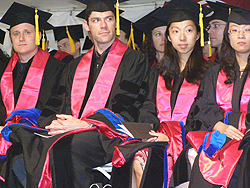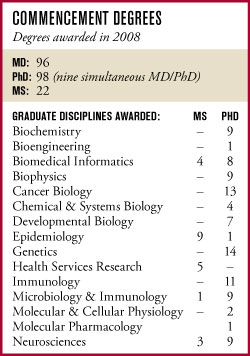June 17, 2008 - By Donna Alvarado
Even before they grinned, giggled and cheered their way to receiving diplomas at commencement on June 14, most of the 2008 graduates of the School of Medicine had plans under way to rush headlong to the next step in their careers.
But before they dispersed to the hospitals, research labs and industry niches that would be their future, some 200 graduates heard a call from one of Stanford's own Nobel laureates to remember what made it all possible: basic science. Roger Kornberg, PhD, who won the 2006 Nobel Prize in chemistry, urged them to support the pursuit of basic science research done purely for its own sake, without regard to purpose or application, that has fueled the major advances in medicine in the last 100 years. He cited everything from antibiotics to genetic engineering to X-rays.
"To solve a basic problem in medicine," Kornberg told the commencement audience, "don't study it directly; rather, pursue a curiosity about nature and the rest will follow."
This year's commencement celebrated the School of Medicine's 100th anniversary since its start in 1908. In all, 22 graduates received a master's of science degree, 98 were awarded doctorates in biomedical fields and 96 claimed a medical degree. Some received multiple degrees.
Under a large white tent on the Dean's Lawn, they walked to the front of the stage to receive the traditional doctoral hoods from faculty members. But first, they heard from Kornberg and Philip Pizzo, MD, dean of the medical school, urging them to be advocates of basic science.
"Our national investment in science has reached a low point," Pizzo told the commencement audience. "Great advocacy is needed. There is work to be done."
Kornberg said there is a danger that society will grow impatient with the slow pace of basic science and instead choose to fund studies of more short-term solutions.
"We are dazzled by the knowledge we have acquired and rush to apply it to medical problems," said Kornberg, professor of structural biology and the Mrs. George A. Winzer Professor in Medicine. He warned, "This is understandable, but often premature."

At the commencement ceremonies June 14, the medical school awarded 98 PhDs, 96 MDs and 22 master's degrees.
He singled out one of greatest scientific achievements of recent years, the sequencing of the human genome, which he called "the true font of medical knowledge."
So far, he said, "We can grasp a tiny fraction of 1 percent of what there is to know and understand. Just imagine, how much more could be possible if we knew the remaining 99 percent?"
Kornberg's own Nobel-winning research showed how DNA is converted into RNA, a process known as transcription. He said work remains to understand how the products of the genome, both protein and RNA molecules, interact in "a dance of extraordinary complexity." But he said he was "disheartened" by a shift he sees in the United States and abroad away from basic research and toward application.
He urged that funding of basic science continue to come from government, because the biomedical industry is less likely to lend support. "Industry, with a short-term interest and eye on the bottom line, can hardly be expected to do so," Kornberg said. "What CEO could report to his or her board that a major investment has been made in research that may or may not become profitable in 10 to 20 years?"

He said drug companies are regularly forced to choose between a drug that cures cancer in one dose or one that must be administered weekly and only prolongs life by a year or two. "Management invariably makes the right choice on behalf of shareholders, and pursues the less-effective drug," Kornberg said.
Although the government has funded biomedical research well in the past, that budget has been repeatedly cut over the past decade. Kornberg said the annual budget for cancer research is now only $5 billion, which is less than 10 percent of our annual spending on soft drinks and less than one week of the war in Iraq.
"At a time when medical science is poised for the ultimate payoff - the cure of cancer and other dread diseases - many promising leads are being abandoned," Kornberg said.
He urged the class of 2008 to not only continue research, but advocate for it. "Yours is the legacy of 100 years of Stanford medicine and of American medical science," Kornberg said. "You will be the ones to carry it forward, to instill it in others and to realize all of our hopes and dreams for the betterment of the human condition."
About Stanford Medicine
Stanford Medicine is an integrated academic health system comprising the Stanford School of Medicine and adult and pediatric health care delivery systems. Together, they harness the full potential of biomedicine through collaborative research, education and clinical care for patients. For more information, please visit med.stanford.edu.